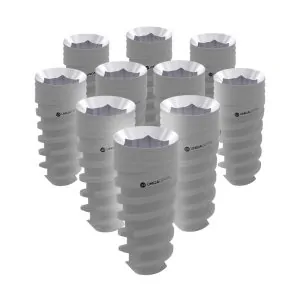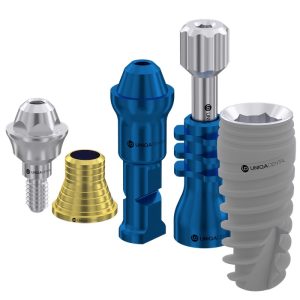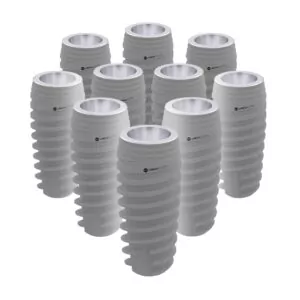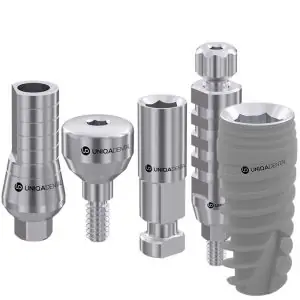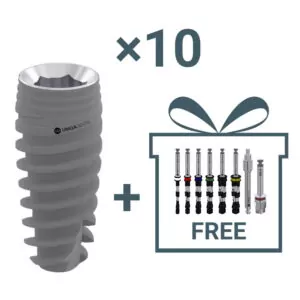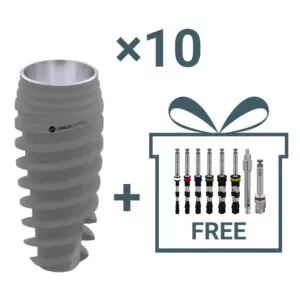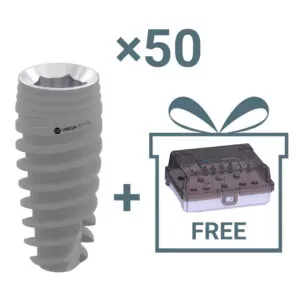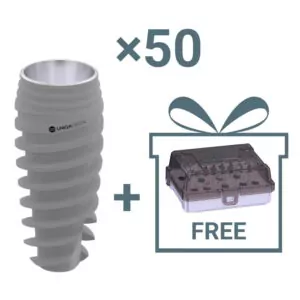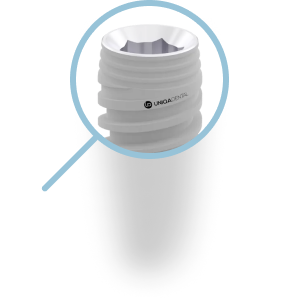In this section, you can buy dental implants manufactured by Uniqa Dental, which are used for single and group restorations as well as for treatment of full adentia in all-on-6® and all-on-4® systems. Uniqa Dental dental implants are made of titanium alloy with vanadium and Grade 23 aluminum, which has excellent strength almost as good as the popular Grade 5 alloy, but surpasses it in ductility, which is important considering the small size of implants, abutments, and especially clinical screws for fixing the abutment to the implant. Let’s find out what you need to know to choose the right implant or dental implant and accessory provider.
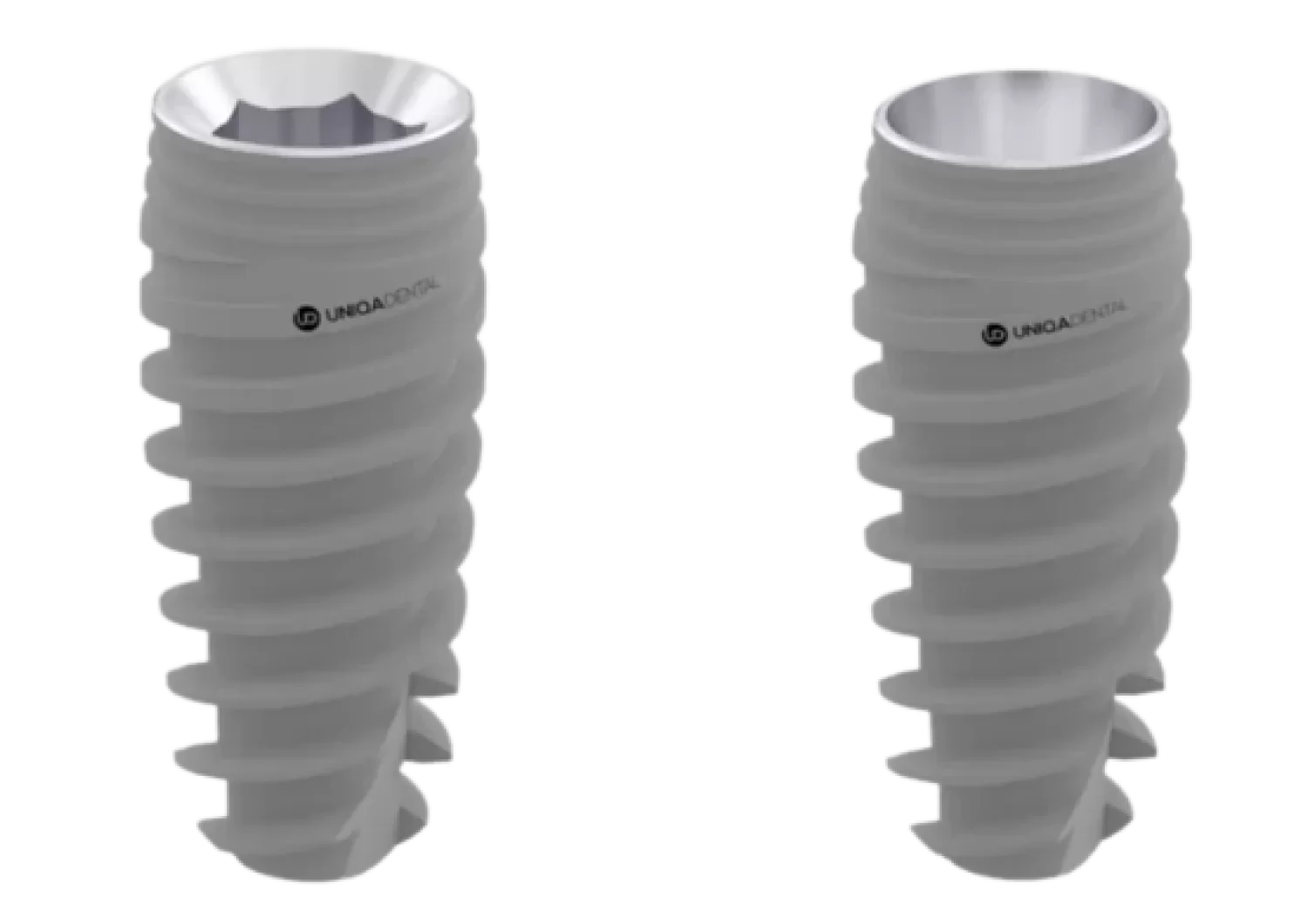
Quality criteria and peculiarities of choosing dental implants
Specialists are right to be wary of new designs on the market and suggestions to try a new dental implant platform. Even though if the system is FDA-approved, you can get good results with it, difficulties with economy-class implants occur more often than with the well-known premium brands. Let’s try to understand why this is the case and what you need to pay attention to before deciding to buy implants from one manufacturer or another. Here’s what’s important to consider when choosing implants:
- Statistics of successful grafts. It is quite high for all manufacturers and ranges from 96 to 99.6%. But by itself cannot be a determining factor for ordering implants. Survival statistics for expensive brand implants are often based on the qualifications and experience of implantologists. Very often the most experienced and successful dentists work with expensive brands. The price for the services of such specialists is high and against this background, the price of the implant is not significant. The success rate of an extra-class specialist is inevitably higher than that of a beginner dentist. Which makes the statistics of expensive brands even better. Conversely, young professionals are more likely to make mistakes, the price of their services is low, and they are more likely to use mid- or low-end implants. When choosing an implant platform, you should pay attention to the success rate of implants, but it is not the key factor.
- The material used to make implants, abutments, and clinical screws. Three types of material are most used for dental implants:
Technical pure titanium – Grade 4 – acceptable strength for most cases and good osseointegration rates.
Titanium-aluminum-vanadium alloy Grade 5 Ti-6Al-4V % – much stronger than the previous version, which is important for implants with small diameters and fixation screws;
Titanium-aluminum-vanadium alloy Grade 23 Ti-6Al-4V ELI, with reduced oxygen content, is comparable in strength to Grade 5, but has better formability and elastic deformation properties. Uniqa Dental chose this material for its entire product line.
Each option has its own advantages, for example, despite its lower fracture strength, Grade 4 fosters bone growth faster. Because pure titanium is more biocompatible than titanium with impurities. But if given a little more time, Grade 5 and Grade 23 implants integrate just as well. The implant material is important when it comes to ordering implants for the aesthetic zone with a diameter of 3.2-3.3 mm. It is better to buy thinner implants made of the stronger alloys Grade 5 and Grade 23, and especially the fixation screws, because they are about a millimeter thick. - The condition of the implant surface and the content of impurities on the surface that is in contact with the bone. This is one of the most important factors for fast and successful integration. In the early days of modern prosthetics all implants had a smooth milled surface. But then it was discovered that the porous surface with many pits and irregularities fused with the jaw much faster, both at the bone and connective tissue level. Here are pictures of the Uniqa Dental implant surface under the microscope.
 One of the most common ways to change the surface of an implant is by sandblasting. The surface is bombarded with a stream of sand and becomes quite rough and porous. But there is a problem, the machining traps tiny particles of silicon in the roughness. As you know, sand is mostly silicon. It is unacceptable to leave sand particles on the surface, so acid etching is used. This method is called SLA treatment. But it is not ideal, as it is not always possible to remove 100% of sand, and it is also not easy to clean the surface after a concentrated acid. That’s why another RBM method appeared, where calcium phosphate is used instead of silica sand. It is softer and it is difficult to obtain the same surface relief, but calcium phosphate is a biocompatible material. And even if microparticles of calcium phosphate remain on the surface, they are fully integrated by the bone tissue.
One of the most common ways to change the surface of an implant is by sandblasting. The surface is bombarded with a stream of sand and becomes quite rough and porous. But there is a problem, the machining traps tiny particles of silicon in the roughness. As you know, sand is mostly silicon. It is unacceptable to leave sand particles on the surface, so acid etching is used. This method is called SLA treatment. But it is not ideal, as it is not always possible to remove 100% of sand, and it is also not easy to clean the surface after a concentrated acid. That’s why another RBM method appeared, where calcium phosphate is used instead of silica sand. It is softer and it is difficult to obtain the same surface relief, but calcium phosphate is a biocompatible material. And even if microparticles of calcium phosphate remain on the surface, they are fully integrated by the bone tissue.
Uniqa Dental uses the proprietary Pure&PorousTM surface treatment method, which combines the advantages of both methods. If you buy implants from Uniqa Dental you get a clean and porous surface. For a successful and fast integration it is important that after processing the contact surface has the highest possible titanium content and as little impurities, especially carbon, as possible. The results achieved by Uniqa Dental are impressive. The table below shows a comparison of the titanium and carbon content between the Uniqa Dental implants of the average of the 62 samples taken in the study published in Poseido.
| Impurities | Av Market per Poseido 2014 Report | Uniqa Dental |
| Ti | 16,80% | 22,50% |
| Carbon | 20,63% | 16,50% |
Moreover, if we compare an implant from Crade 4 with a large amount of impurities on the surface and an implant from Uniqa Dental from Grade 23 with a clean surface, then the rate of osseointegration will be higher in Uniqa Dental.
4. Available implant sizes and bone volume requirements. Not all manufacturers offer thin implants for placement in the anterior tooth zone. There are also different requirements for the width of the alveolar ridge for implant placement. Biologically, the implant must be surrounded by at least 1.6-1.8 mm of bone on all sides. Otherwise, resorption and denudation of the implant neck will occur. Some manufacturers have even higher bone volume requirements. Pay attention to this before ordering implants.
5. Implant geometry. There are many important nuances here, let’s take Uniqa Dental implants as an example:
- The double thread shape facilitates implant placement, while the aggressive shape at the bottom allows it to cut into bone and improves the primary stability of the implant.
- Variable thread profile from sharp and aggressive in the lower part of the implant, to rounded massive coils in the middle and upper part – this stabilizes the implant and gives tight contact with the bone.
- The second conical constriction in the upper (coronal) part of the implant allows the cortical layer to straighten after the osteotomy and gently compress the implant. In addition, this form of implant takes up less space at the level of soft tissues, so the restoration looks more aesthetically pleasing.
What dental implants can be bought on the Uniqa Dental website
Implants for hexagon as well as for a conical connection are available for order through our website. The conical connection has several advantages:
- A tighter fit between the base of the abutment and the inner hole of the implant. This is a very important area since the micro-movement of the abutment relative to the implant leads to the so-called bacterial pumping. That is, biological fluids from a non-sterile oral cavity are pumped into the depth of the implant. And this can lead to chronic inflammation.
- The platform switch is shaped like a step between the implant and the abutment. And this is good because there is additional space for soft tissue integration. During the healing process, a gingival collar is formed around the implant to separate the non-sterile oral environment from the sterile bone environment and the surrounding keratinized gingiva. Due to this step, bone resorption around the implant is reduced. However, this advantage only works if the initial thickness of the gingiva above the alveolar ridge was greater than 3 mm.
But the classic hexagon also has its advantages. The difference in resorption reduction with a tapered connection is undeniable, but not as significant. And the hexagon interface provides greater connection strength especially with lateral loads on the denture. That is why you can buy Uniqa Dental implants in both modifications.
Regarding the size grid of implants that can be ordered through this site, the following sizes are always available, see tables below.
| Implant height | Implant diameter | 3.3 mm | 3.75 mm | 4.2 mm | 5 mm |
| 8 mm | ● | ● | ● | ● | |
| 10 mm | ● | ● | ● | ● | |
| 11.5 mm | ● | ● | ● | ● | |
| 13 mm | ● | ● | ● | ● | |
| 16 mm | ● | ● | ● | ● | |
The dimensional grid is the same for both variants of the connection interface.
Why it is profitable to buy implants from Uniqa Dental
Changing an existing supplier or looking for a new one is a responsible step. The most important thing is to be sure that the products are of the right quality and that the supplier will deliver the order on time. Recall the benefits for customers who decide to buy implants from Uniqa Dental:
- The manufacturing precision is the highest. Tolerances (permissible deviations) are the smallest, which allows you to get modern equipment. Not all manufacturers achieve this level of precision in manufacturing parts.
- Two options for abutment connection platforms – conical and internal hexagon. The conical connection with platform adventure provides a tighter connection with minimal risk of bodily fluids penetrating through the implant/abutment connection. In addition, abutments and other hex accessories are available that are compatible with implants from other brands.
- Material – Grade 23 was chosen due to the combination of superior strength and improved ductility.
- Excellent quality surface that provides fast osseointegration. The degree of roughness and surface finish is one of the best in the world. Due to this, Uniqa Dental was able to compensate for the lack of titanium alloys compared to pure titanium.
You can also order all-in-4® or all-in-6® implant kits through the Uniqa Dental website. Also, to check the quality of our products we have test kits available from $1.

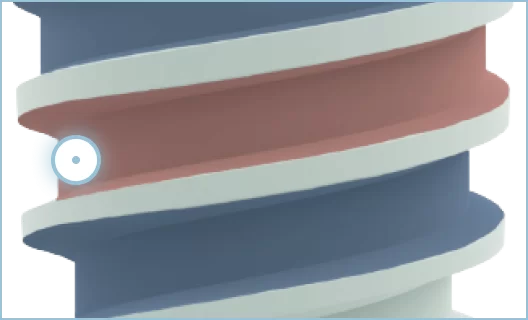
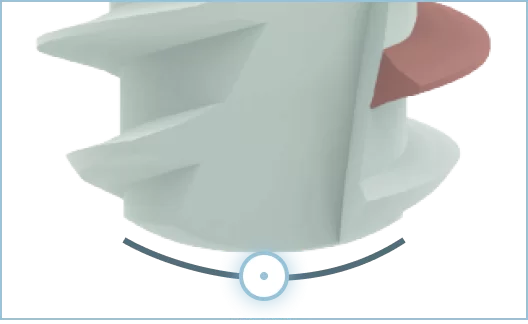
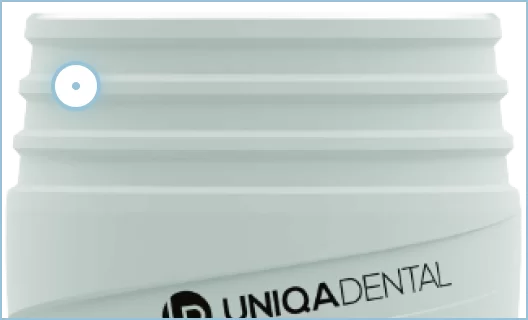
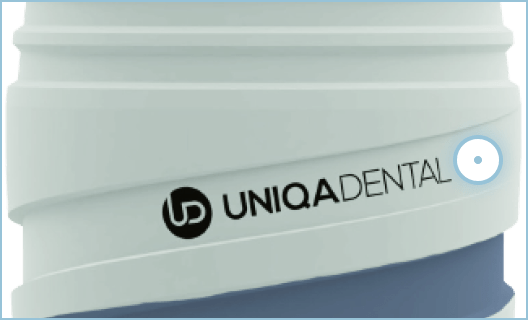

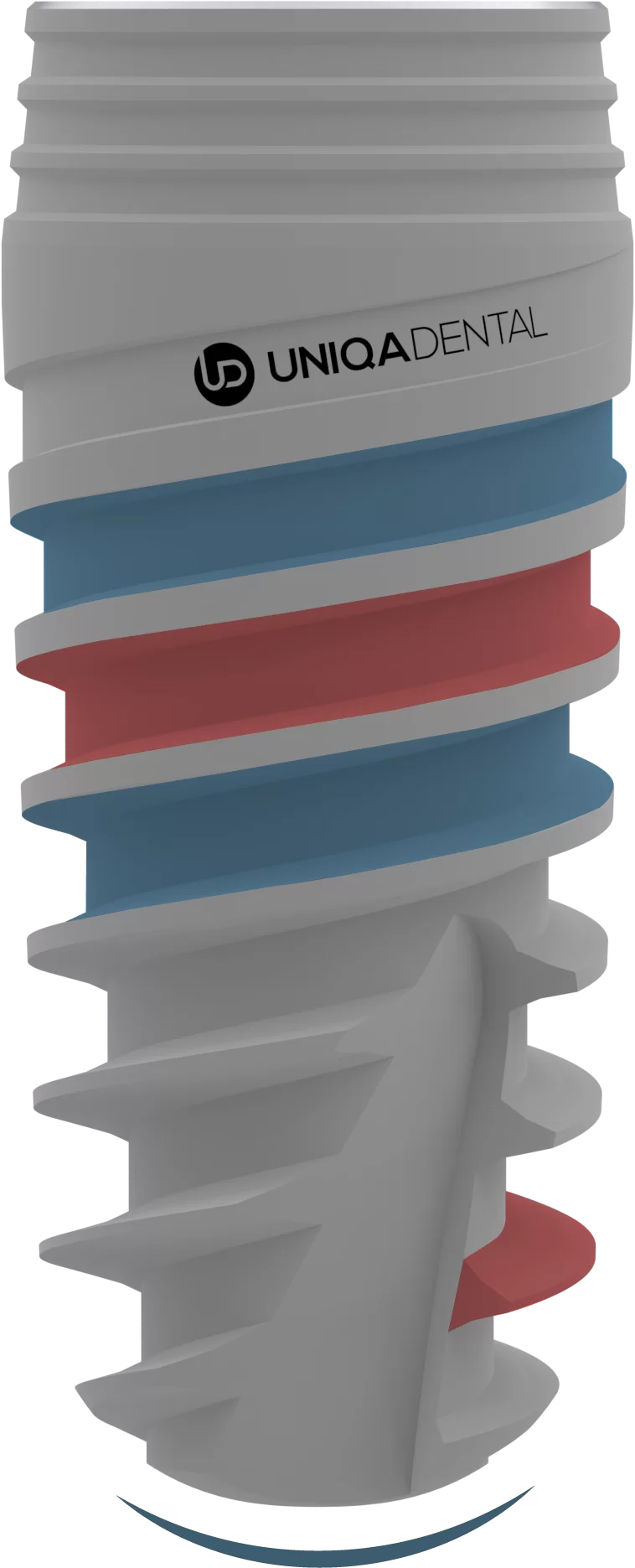
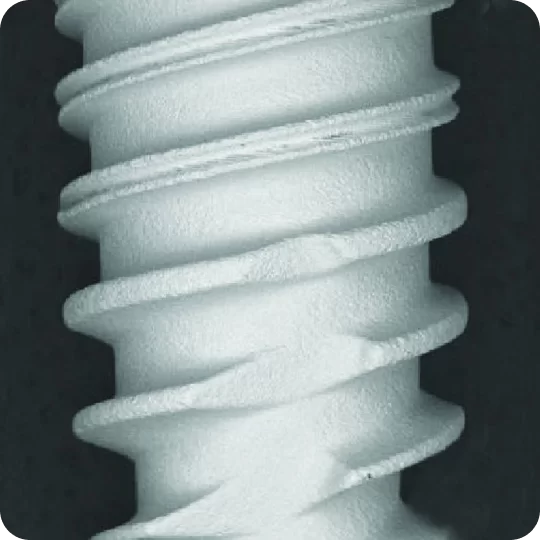 Cleanliness
Cleanliness 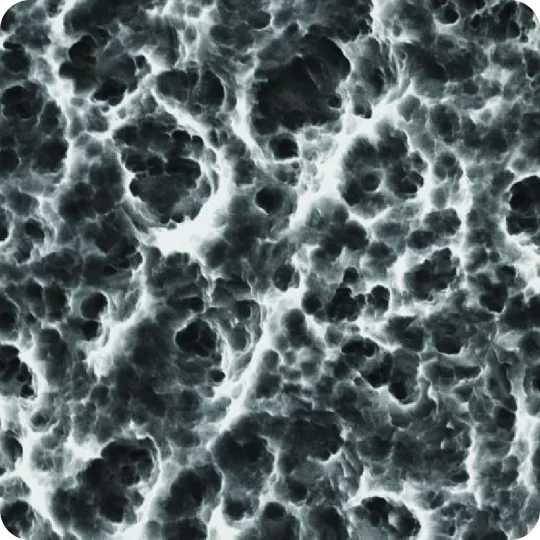 Porosity
Porosity 